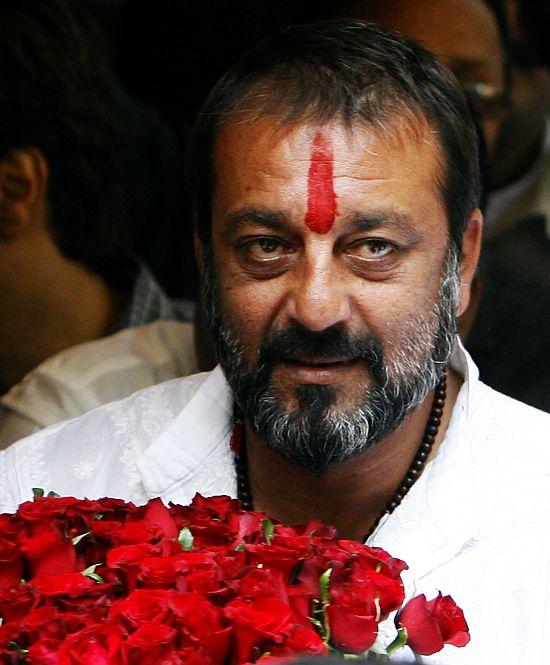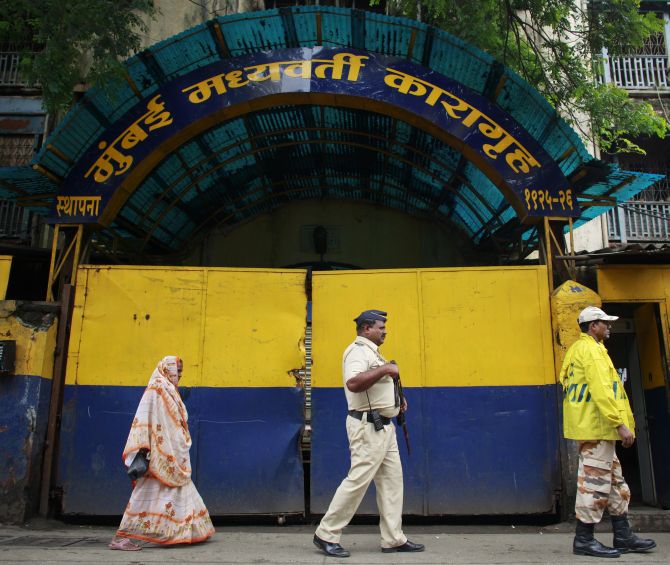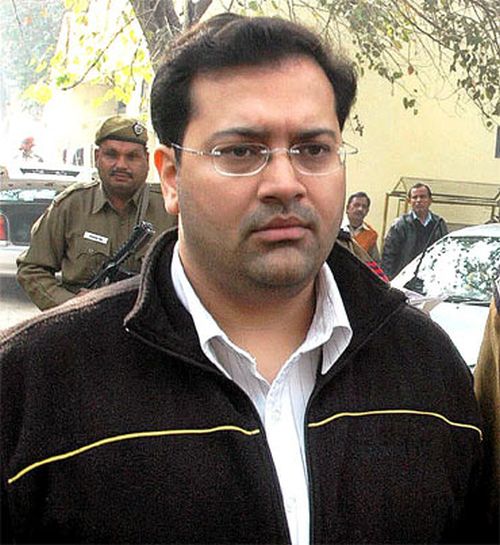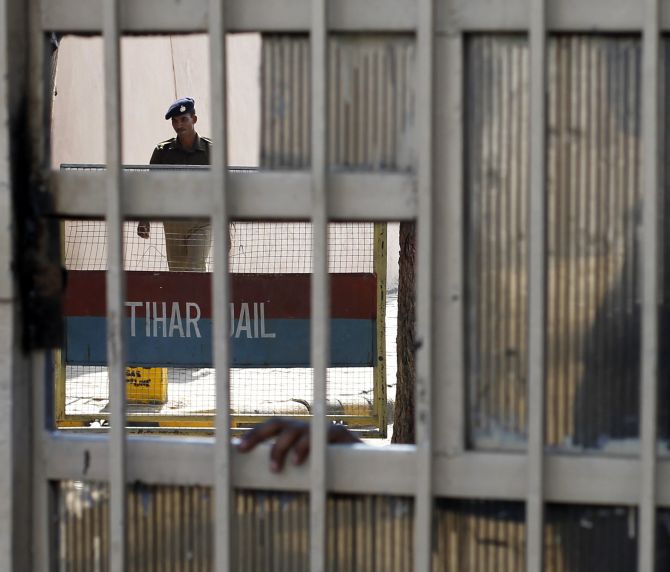 | « Back to article | Print this article |
Why 'parole favours' to Sanjay Dutt are so UNFAIR
Sanjay Dutt’s ‘parole favours’ are bound to evoke public anger when one considers the fact although the Bollywood star has been granted parole thrice in nine months. Authorities across the country have considered only 228 out of a total 4,146 parole applications filed in the last four years.
And if that’s not enough, Maharashtra has a dubious record in terms of not granting parole as it has considered only 8 out of 150 applications since 2010. Vicky Nanjappa reports.
Bollywood actor Sanjay Dutt, convicted by the Supreme Court for possession of illegal arms in connection with the 1993 Mumbai blasts case and sentenced to five years imprisonment, seems to be spending more time outside jail than inside it.
The actor, who had earlier served 18 months of imprisonment, has been granted parole thrice by the Maharashtra government ever since he surrendered before a Mumbai court in May 2013 to serve the remaining period.
The Bombay high court is seized off the matter and many are right when they ask if the provision of parole is granted liberally only to the rich and famous.
While the laws regarding parole were made to imbibe some amount of humanity on prisoners, one cannot ignore the ugly fact that 198 murders have been committed by people who were out on parole in the last 10 years.
As many as 98 murders were committed by people out in parole in 2005 alone, official data points out.
Please click NEXT to read further…
Only 5.5 per cent parole applications considered since 2010
Pending applications:
Out of 4,146 parole applications received by all the jails across the country since 2010, only 228 (5.5 per cent) have been considered so far. The rest 3,918 applications have either been rejected or are pending before the authorities.
Interestingly, Maharashtra, accused by many for showing extra favour to Sanjay Dutt, has a dubious record regarding parole. The authorities have only considered 8 parole applications out of the total 150 filed before jails across the state in the same time span.
It is also to be noted here that some of the parole applications have been filed by people above the age of 60 years.
In such an event, it is quite surprising that Dutt has been granted parole twice and even got an extension.
Please click NEXT to read further…
Parole rules different for the rich and famous?
In the Dharmvir vs state of Uttar Pradesh case, the Supreme Court had held that a prisoner shall be allowed parole for two weeks once a year. The jail manual, however, states the period shall be up to two months once a year, but with this apex court verdict what is mentioned in the manual can be overridden.
Another case where a rich and famous was granted parole was Manu Sharma. He was out on parole after his conviction in the Jessica Lal murder case, and ironically after he came out he was involved in a bar brawl in Delhi.
Sharma had violated the provisions of parole and hence would not be entitled for another until the completion of his sentence.
Rules regarding parole:
The provision starts off by stating that the prisoner shall get leave from jail for a short duration. Under the jail manual a prisoner shall be released on parole only on the following conditions:
- Complete and incurable blindness.
- Advanced pulmonary tuberculosis, which incapacitates the prisoner from committing further crimes of the nature for which he or she was sentenced.
- If he/she is dangerously ill, and is likely to have a better recovery outside prison.
- If he/she has become mentally unstable and requires treatment in an asylum.
Apart from the health reasons, a prisoner may also be granted parole:
- To perform funeral rites
- To visit a sick or dying member of the family
- To attend important functions, such as marriage of son, daughter, brother or sister
- To construct a house or repair a badly damaged house.
The objectives:
- To enable the inmate to maintain continuity with his family life and deal with family matters
- To save the inmates from the evil effects of continuous prison life;
- To enable the inmate to retain self-confidence and active interest in life.
Please click NEXT to read further…
Only 18 per cent convicts in the country granted parole
Sanjay Dutt may have fulfilled some of these conditions, but then his is a case which clearly suggests that it is his fame and links that have entitled him for such long periods of parole.
Statistics till 2014 show that there are 80 per cent under-trials in the country who have not met their families in the past five to ten years. Not only have they not been able to get out for a short duration, but in several cases, the families have not been permitted into the jail either.
Statistics with regard to the convicts across the country show that just 18 per cent of all the prisoners have been extended the facility of parole despite some giving valid reasons.
The Supreme Court on parole:
In every possible judgment on this issue, there is one thing that is clear and that is the court always maintained parole should be granted under extraordinary circumstances and also considering the fact that a prisoner has spent a lot of time in jail. The Supreme Court has maintained that granting parole for reasonable time would be subject to sufficient safeguards which include not leaving the jurisdiction and also proper behaviour.
In the Dharmvir vs Uttar Pradesh case, the Supreme Court held that parole should be granted so that prisoners are not totally cut off from society. Here it was clearly stated that a prisoner shall be allowed to go on parole for two weeks once a year.
Some other notable judgments:
Babulal Das vs state of West Bengal: It is fair that persons kept incarcerated and embittered without trial should be given some chance to reform themselves by reasonable recourse to parole power under Section 15 of the Maintenance of Internal Security Act, 1971.
Suresh Chandra vs state of Gujarat: It recommended liberal use of parole as a viable alternative for reducing overcrowding in prisons.
Kesar Singh Vs state of Himachal Pradesh: For exercising the power, function and duty to temporarily release the prisoners on parole, the paramount consideration which the releasing authority shall bear in mind is that the right to be released is not defeated merely because the prisoner on account of his impecunious condition is unable to offer a security bond or surety bond.
The discretion to waive the requirement of furnishing bond should be exercised in cases of poor prisoners bearing in mind other relevant considerations of family-ties, roots in community and social conditions.
TOP photo features you missed last week
Click on MORE to see another PHOTO feature...




